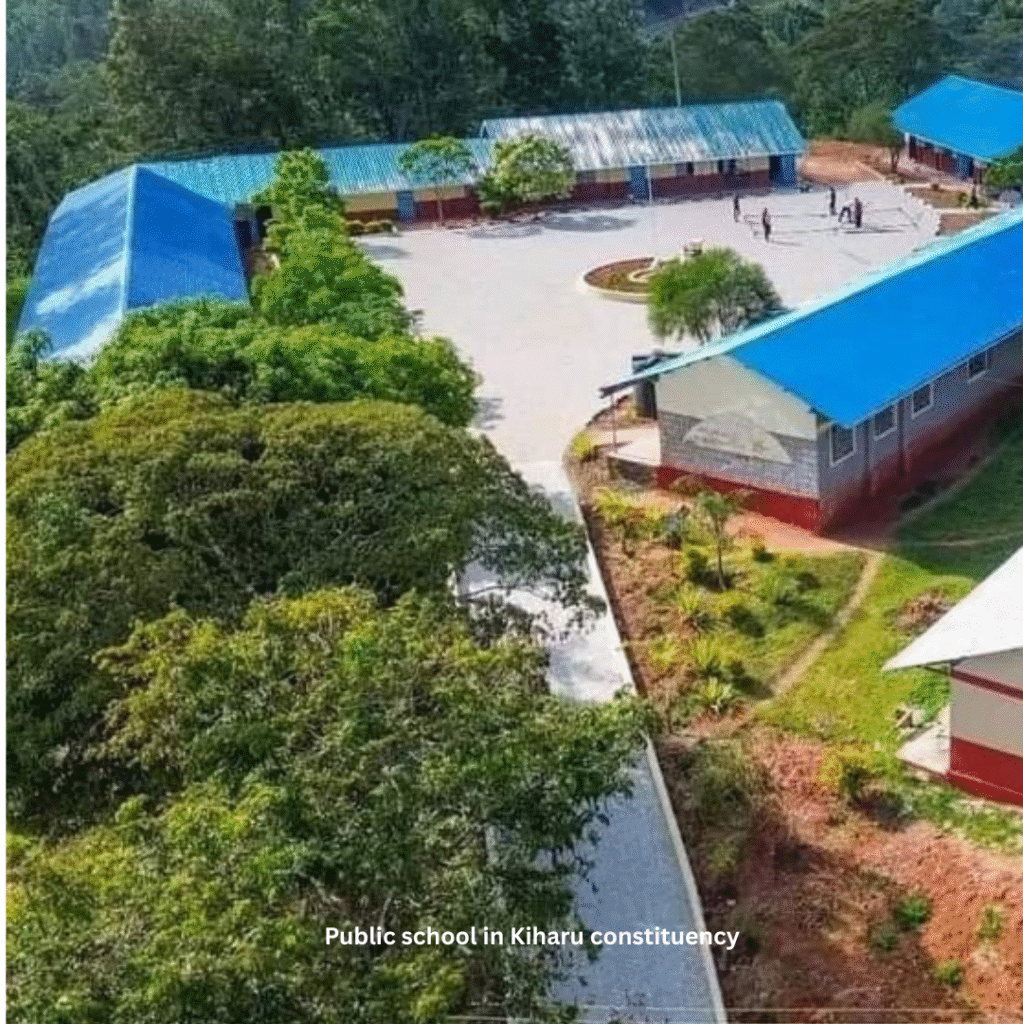Physical Address
Nairobi Kenya
Physical Address
Nairobi Kenya


“As the chairperson of Budget & Appropriation Committee, Nyoro used to allocate his constituency more NG-CDF resources illegally. He used to oversee skewed allocation of funds. Let’s tell Kenyans the truth, Which member of parliament here… can afford through his NG-CDF to build classrooms, plaster them, put windows, put roof, tiles in the classroom… cabro in the… Mr. Speaker, which member of parliament can afford to do that here, with meagre resources of 100Million Mr speaker… and advertise on Citizen prime time News… Which member can do that? Can you raise your hand if you can do that? None of the 349 members of this house Mr Speaker can afford to do that. That can only be done by somebody who has access to bigger resources than any other member mr Speaker” Said Junet Mohamed who is a member of parliament, representing Suna East Constituency, Migori county.
Junet was throwing shades at Ndindi Nyoro who is a fellow member of parliament, just like him, representing Kiharu constituency in Nyeri county for managing to put tiles and cabros in schools in his constituency.
Let’s reimagine our next republic by delving deeper into this. First thing first, let us look into the fund itself;

So, what is NG-CDF and how is it allocated?
The National Government Constituencies Development Fund (NG-CDF) is a Kenyan public fund established to support grassroots development projects at the constituency level, which Junet and Ndindi Nyoro represent. The fund was established in 2003 under the Constituencies Development Fund Act and has since undergone various legal reforms. The current framework is the National Government Constituencies Development Fund Act, 2015, following the 2010 Constitution, which restructured government functions.
By design, this fund is intended to address local development needs, improve service delivery at constituency level, fund community prioritized projects mostly education, security and infrastructure. To cut it short and make it clear, in its current model, most members of parliament utilize NG-CDF for education bursaries for the needy students in the constituency, construction of classroom and other school amenities like lavatories or laboratories, administration centers for police, police posts etcetera. Simple, no complications, no rocket science.
The funds are disbursed by NG-CDF board each financial year to each of the 290 constituencies based on a common formula.
Formula for allocation.
The allocation of the National Government Constituencies Development Fund (NG-CDF) in Kenya is guided by a two-part formula. Seventy-five percent (75%) of the total fund is distributed equally among all the 290 constituencies, regardless of differences in size, population, or economic status. Ideally this means each constituency gets approximately 0.26% of the total NG-CDF from the 75% pool including Suna East represented by Junet.
The remaining twenty-five percent (25%) of the fund is distributed based on a formula that takes into account the poverty index and population size of each constituency. Well, logically, this is the percentage that forms the core of Junet Mohamed’s public criticism against Ndindi Nyoro, the former Chairperson of the Budget and Appropriations Committee (BAC) in the National Assembly.
According to Junet, Ndindi Nyoro allegedly took advantage of his influential position to disproportionately allocate more resources to his own constituency at the expense of the others. This, going by Junet’s argument, is the reason why other MPs haven’t been able to put tiles and cabros in their constituency schools.
To illustrate the issue further, suppose this 25% were also shared equally among all 290 constituencies. In that case, each would receive an additional 0.09% of the total fund, bringing the total allocation per constituency to 0.35%, that is, 0.26% from the equal share of the 75% plus 0.09% from an equally divided 25%. Now, in order to validate Junet’s criticism with a hypothetical scenario, assume Ndindi allocated 5% of the total fund to his own constituency and left the remaining 20% to be shared among the remaining 289 constituencies, would that be sufficient justification as to why other MPs, including Junet haven’t been able to tile their constituency schools?
How “meagre” is the Constituencies Development Fund (CDF)?
To understand this, let’s examine the 2024/2025 fiscal year budget and apply the fund’s allocation formula.
Kenya’s total budget for the fiscal year 2024/2025 was approximately Ksh 3.99 trillion. Of this, the National Government Constituencies Development Fund (NG-CDF) received an allocation of Ksh 63.0 billion, which represents 2.5% of the national government’s share of revenue as mandated by law.
According to the established formula, 75% of the NG-CDF allocation, equivalent to Ksh 47.25billion was divided equally among the country’s 290 constituencies. This means that each constituency, including Suna East represented by Junet Mohamed, received approximately Ksh 162.93 million from this equal share.
The remaining 25% of the fundamounting to Ksh 15.75 billion was distributed based on factors such as population size and poverty levels. For this portion, Suna East received about Ksh 7.4 million, while Kiharu constituency, represented by Ndindi Nyoro, received around Ksh 25.48 million. Combining both shares, the total NG-CDF allocation for Kiharu was approximately Ksh 188.41 million, while Suna East received about Ksh 170.33 million for the 2024/2025 financial year.
Now, considering these amounts, the question arises: how many tiled classrooms can a budget of roughly Ksh 170 million support besides other development projects? Let’s say even as few as five schools hypothetically in the 2024-/2025 financial year. And how “meagre” is that sum when it comes to infrastructure improvements like installing window panes, tiles roofing, painting or renovating classrooms in five schools? How much do tiles, roofing sheets, window panes and paint cost? Are those too expensive to be considered in the “meagre” budget? And if 170 million will be meagre, how much would be sufficient to be able to install window panes?
Looking beyond just one financial year, Junet Mohamed has served as the Member of Parliament for Suna East since 2013. Over this period of more than a decade, a substantial amount of NG-CDF funds have been allocated to his constituency. The critical question is: how effectively has Junet Mohamed utilized these funds to improve the welfare and infrastructure of Suna East?
Can the chair of (BAC) allocate his constituency more NG-CDF resources than the others?
Let us shift focus to the mandate of (BAC). The BAC plays a critical legislative and oversight role in matters concerning public finance and development funds, including the NG-CDF.
Among its core responsibilities, the BAC reviews the overall national budget estimates, which includes confirming the allocation to the NG-CDF. It ensures compliance with legal provisions—notably that at least 2.5% of the national government’s ordinary revenue is allocated to the NG-CDF, as stipulated in law. The committee also scrutinizes how these funds are distributed across the 290 constituencies, ensuring that allocations follow the prescribed formula: 75% of the total NG-CDF is shared equally among all constituencies, and the remaining 25% is distributed based on poverty levels and population size.
In addition, the BAC reviews financial reports and performance audits from the Office of the Auditor-General concerning the NG-CDF. These reviews help to monitor how the funds are utilized and ensure accountability in their use at the constituency level.
Importantly, the Chairperson of the BAC does not possess unilateral authority to allocate more NG-CDF resources to their own constituency at the expense of others. Kenya’s public finance framework is designed to prevent such misuse of power. All NG-CDF allocations are guided by the law, subjected to formula-based distribution, and overseen by the NG-CDF Board, which is an independent administrative body.
While the BAC Chairperson may wield significant influence over budget discussions and policy direction, decisions within the committee are made collectively, and any budget recommendations must be debated and approved by the entire National Assembly in which Junet sits. Therefore, although the Chairperson may play a prominent role in shaping fiscal priorities, they cannot personally divert NG-CDF funds unfavorably bypassing the law.
Ndindi Nyoro has served as the chair BAC from November 3, 2022, until March 12, 2025, a tenure spanning approximately 2 years and 4 months. However, on March 12, 2025, Ndindi Nyoro was replaced as the BAC Chairperson by Samuel Atandi, the Member of Parliament for Alego Usonga. He has served as the member of parliament for Kiharu for a total of 8 years since 2017. On the other hand, Junet Mohamed has served as an MP for a total of 12 years, since 2013. So, this simply means, Junet Mohamed has managed CDF for a longer duration than Ndindi Nyoro.
Public Reactions on this issue
Following Junet’s remarks, Kenyans have expressed mixed opinions on this whole issue. Here’s a snapshot of the public discourse:
Peter pointed out that Kiharu has historically had a strong development record, even before Nyoro became MP. He questioned whether Nyoro’s success is truly exceptional, citing other constituencies like Gatanga, Mathira, and Othaya that have also demonstrated commendable development. “Who was funding their projects?” he asked, implying that development might not solely be about budget allocation.
Ahanb questioned whether Ndindi was present in Parliament during the initial budget proposals. He acknowledged Nyoro’s political savvy, suggesting, “If he was involved at that stage, then he’s indeed quite smart and possibly outshining other MPs.”
Muriu Boniface posed a critical question: “What has Junet achieved with the little budget he has received in his Suna East Contituency?” hinting at the importance of prudent resource utilization.
Skinyua Mark criticized the negative sentiments towards performing leaders, asking rhetorically, “Are we now supposed to fight those who are actually delivering results?”
Jane expressed skepticism about Nyoro’s timeline of accomplishments. “He’s only been the Budget Committee chair for just about 2.4 years. Are we to believe he did all that in such a short time? Sounds like empty rhetoric.”
James dismissed excuses made by other leaders. He noted that Nyoro, while not acting alone, has shown results within the same parliamentary structures others operate under. He added, “The entire Parliament must approve budget proposals and Junet is part of that parliament. Junet is just surprised at his own inaction over the years.”
Jimmy applauded Nyoro’s approach, saying, “Turning small ideas into successful projects is real leadership. Speaking grandly and delivering nothing is the worst kind of leadership we have.”
Patrick challenged critics, stating, “If you’re not a performer, don’t expect others to match your level. Learn from those who deliver instead of criticizing.”
Jackson was blunt in his criticism of those questioning Nyoro’s record: “Show us what you’ve done with your own NG-CDF before barking like a mad man.”
#WatchOutForNextRepublik